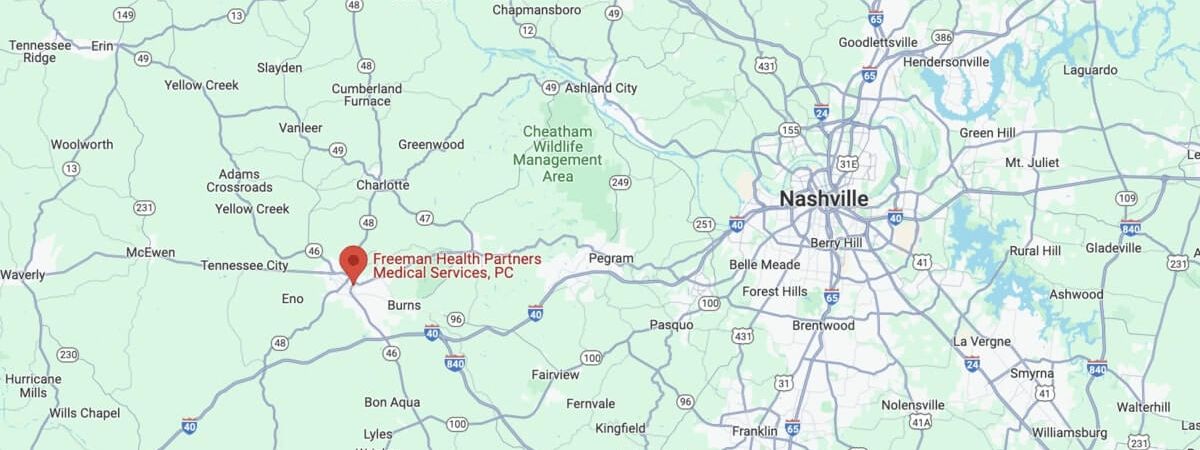Treatment for Personality Disorders For Individuals
Personality Disorder Treatment Options
Freeman Health Partners provides complete therapy programs and primary care services in Tennessee, offering compassionate and personalized treatment for various personality disorders. Our centrally located, Nashville-based facilities offer a supportive environment for people seeking effective and holistic mental health care.
In addition to treating personality disorders, the Freeman Mental Health Program offers therapy programs for mental health, dual diagnosis, and primary care, addressing both emotional and physical well-being comprehensively. We are here for your behavioral health needs.

What is A Personality Disorder?
A personality disorder is a mental health condition defined by enduring patterns of thinking, feeling, and behaving that deviate from societal expectations. These patterns often lead to difficulties in relationships, work, and emotional well-being. People with personality disorders may experience emotional instability, impulsive behaviors, and challenges in coping with everyday life.
Personality disorder treatment focuses on addressing these behavioral patterns through comprehensive therapy and support. Personality disorder therapy often includes psychotherapy, cognitive behavioral therapy (CBT), and dialectical behavior therapy (DBT) to help you manage symptoms. Coping with personality disorder involves learning healthy ways to manage emotional instability, improve interpersonal relationships, and enhance self-awareness. With proper treatment and personality disorder support, you can achieve significant improvements in your quality of life.
How to Find Treatment for Personality Disorder in the Nashville, Tennessee Area
Finding effective treatment for personality disorders in the Nashville, Tennessee area can be challenging, but Freeman Health Partners (FHP) is here to help. Our dedicated team offers comprehensive treatment options for your needs. We specialize in therapies such as Dialectical Behavior Therapy (DBT) and Cognitive Behavioral Therapy (CBT), to support you in managing your symptoms and improving your quality of life.
If you or a loved one is seeking assistance, don’t hesitate to reach out. You can call us directly at (615) 879-3582 or fill out our Contact Us form. Our compassionate staff is ready to guide you on the path to recovery and provide the support you need.

Other Ways to Find Treatment For Personality Disorders Near Me
Finding treatment for personality disorders can be a crucial step toward recovery. In addition to reaching out to specific facilities, there are various ways to locate appropriate care near you. Here are some effective strategies:
- Search Online: Utilizing online resources is an excellent starting point. You can use search terms like “Personality Disorder Treatment in Tennessee” or “Mental Health Services in Nashville.” Websites such as Psychology Today and the Substance Abuse and Mental Health Services Administration (SAMHSA) provide directories of licensed therapists and treatment centers, making it easier to find qualified providers in your area.
- Verify Accreditation and Credentials: Before choosing a treatment facility, it’s essential to verify its accreditation and the credentials of its staff. Look for facilities accredited by reputable organizations such as the Joint Commission or the National Committee for Quality Assurance (NCQA). Ensure that therapists have appropriate licenses and training to treat personality disorders, as this can significantly impact the quality of care.
- Visit the Facilities: If possible, visiting potential treatment facilities can provide valuable insights into the environment and services offered. During your visit, observe the facility’s cleanliness, safety, and overall atmosphere. Meeting with staff can help you gauge their professionalism and approach to care. A personal visit allows you to assess whether the facility aligns with your needs and comfort level.
- Evaluate Programs: Take the time to evaluate the specific programs offered by each treatment center. Different facilities may specialize in various therapeutic approaches, such as Dialectical Behavior Therapy (DBT) or Cognitive Behavioral Therapy (CBT). Ensure that the holistic therapy programs are designed to address personality disorders and consider factors like group therapy options, individual counseling, and any additional support services available.
- Review Insurance Coverage: Understanding your insurance coverage is vital when seeking treatment. Contact your insurance provider to inquire about mental health benefits and which facilities are in-network. Some treatment centers, like Freeman Mental Health, may also offer financial assistance or sliding scale fees for those without insurance. Reviewing your coverage options will help you make informed decisions and minimize out-of-pocket costs.
- Assess Location and Accessibility: Finally, consider the location and accessibility of treatment facilities. Choose a center that is convenient for you, whether it’s close to home or work. Accessibility factors, such as public transportation options and parking availability, are also essential. Finding a location that is easy to reach can enhance your commitment to attending therapy sessions and participating in your recovery journey.
Middle Tennessee and its Most Visited Local Attractions and Landmarks
Middle Tennessee offers a welcoming environment for personality disorder recovery, with its serene landscapes and numerous attractions. Exploring iconic sites like the Grand Ole Opry, Ryman Auditorium, and Bridgestone Arena can provide enriching experiences. Nature lovers can find peace at Nashville Zoo, Montgomery Bell State Park, or Percy Warner Park, offering soothing surroundings conducive to healing.
Cultural gems like the Country Music Hall of Fame, Andrew Jackson’s Hermitage, Cheekwood Botanical Garden, and The Parthenon combine history and beauty, fostering emotional well-being. Visitors can also enjoy the calm of Cumberland Caverns, Old Stone Fort State Archaeological Park, or Bell Witch Cave. Middle Tennessee’s vibrant blend of nature, history, and culture makes it an ideal backdrop for holistic recovery.
Free Mental Health Assessments
What Causes A Personality Disorder?
The causes of personality disorders are complex and typically involve a combination of genetic, environmental, and psychological factors. Research suggests that personality disorders often develop in response to early life experiences, including trauma, neglect, or significant stress during childhood. These experiences can shape a person’s personality and coping mechanisms, leading to maladaptive patterns of thinking and behavior as they grow older.
Additionally, genetic predispositions may make certain people more susceptible to developing personality disorders, particularly if there is a family history of such conditions.
Another significant contributing factor is the impact of one’s environment, including family dynamics, cultural influences, and social relationships. Children raised in dysfunctional households or those who experience inconsistent parenting may be more likely to develop personality disorders. Moreover, those who have faced significant life changes or challenges, such as the loss of a parent, bullying, or chronic stress, may also be at increased risk.
Common signs of personality disorders often manifest as pervasive patterns of behavior that deviate from cultural norms. These behaviors can affect how you think, feel, and relate to others, leading to difficulties in various aspects of life. It’s essential to recognize these signs early on to facilitate appropriate interventions.
Some common signs of personality disorders may include:
- Difficulty in maintaining stable relationships or keeping friends
- Patterns of intense emotional responses, often perceived as extreme or excessive
- A pervasive sense of emptiness or dissatisfaction in life
- Difficulty managing emotions, leading to impulsivity or erratic behavior
- Rigid thinking patterns that result in difficulty adapting to change
- A tendency to see things in black-and-white terms, lacking nuance
- Inability to empathize with others or recognize their feelings
- Chronic feelings of anxiety, depression, or irritability in social situations
What are Signs or Symptoms That An Individual May Have A Personality Disorder?
Recognizing the signs of a personality disorder can be crucial in identifying when someone may need professional help. Personality disorders typically involve long-term patterns of behavior and inner experiences that significantly differ from cultural expectations, causing distress or impairing everyday functioning. People with personality disorders often struggle with emotional regulation, relationships, and self-perception.
Some common symptoms of a personality disorder include intense mood swings, difficulty maintaining stable relationships, and patterns of distrust or paranoia. Other signs may include extreme sensitivity to criticism, persistent feelings of emptiness, a distorted sense of self, and impulsive or risky behaviors. These personality disorder symptoms can manifest in different ways depending on the specific disorder, such as borderline, narcissistic, or antisocial personality disorders.
Here are some key signs of personality disorder to watch for:
- Emotional instability or frequent, intense mood changes
- Difficulty in forming or keeping close relationships
- Patterns of manipulative or controlling behavior
- Persistent feelings of loneliness or emptiness
- Chronic fear of abandonment
- Risk-taking or impulsive actions
- Self-harm or suicidal thoughts in more severe cases
While personality disorder causes can be complex, a combination of genetic, environmental, and psychological factors often contributes. Early intervention and appropriate personality disorder therapy can help you develop healthier ways of coping, improving your emotional and interpersonal life.
How Much Does Personality Disorder Treatment Cost in Middle Tennessee?
The cost of personality disorder treatment in Nashville, Tennessee, can vary widely depending on the type of services required. On average, therapy sessions range from $100 to $250 per visit, while residential treatment programs may cost between $500 to $2,000 per day. Insurance coverage can significantly impact out-of-pocket expenses.
Additional costs may include medication, assessments, and ongoing support services, which can further influence overall treatment expenses. It’s essential to consider insurance options and explore local resources to help manage costs. Many facilities in , including Freeman Mental Health, offer financial assistance or sliding scale fees, making treatment more accessible for those in need of support.

We Accept Most Major Insurance Providers in Tennessee
At Freeman Health Partners, we understand the financial concerns that accompany the decision to seek mental health and primary care services. That’s why we’re committed to making our services as accessible as possible by accepting most major insurance providers in Tennessee. This includes Aetna, Carelon, Blue Cross Blue Shield, Cigna, and Humana.
Our goal is to ensure that everyone who needs our help can receive it, regardless of their insurance coverage. We encourage you to take the first step towards better mental health by filling out our online form. This will allow us to determine your health insurance coverage levels for mental health and primary care services. By understanding what services your insurance covers, you can start your journey with confidence, knowing that you have the financial support you need.




Check Your Insurance By Phone

Does Insurance Cover Treatment for Personality Disorders in Nashville, Tennessee?
Yes, insurance often covers treatment for personality disorders in Nashville, Tennessee, but coverage can vary based on the provider and specific plan. To determine how to get treatment for a personality disorder, you should review your insurance policy and contact us at Freeman Primary Care to understand what services are covered and any associated out-of-pocket costs.
Many mental health treatment centers in Nashville accept various insurance plans, including Medicaid and private insurance. It’s beneficial to inquire about in-network providers to minimize costs. Additionally, some facilities, including Freeman Health Partners, offer financial assistance or sliding scale fees for those without insurance or with limited coverage, making treatment more accessible to those in need.
Which Health Insurance Providers Cover Treatment for Personality Disorders in the Nashville, Tennessee Area?
In the Nashville, Tennessee area, several major health insurance providers cover treatment for personality disorders. These include BlueCross BlueShield of Tennessee, known for its extensive network of mental health providers, and Cigna, which offers comprehensive mental health benefits, including therapy and medication management. Other options include Aetna and UnitedHealthcare, which cover both inpatient and outpatient treatment for personality disorders.
Additionally, Humana offers mental health coverage as part of their health plans, and Medicaid provides coverage for eligible people in Tennessee. It’s essential to verify specific coverage details with each provider to ensure accurate information on available benefits and services related to personality disorder treatment. We can help clarify your insurance situation at Freeman Mental Health.
Are There Different Kinds of Personality Disorders?
Personality disorders are classified into three groups: Group A, Group B, and Group C, based on shared characteristics and symptoms. Group A personality disorders are marked by odd or eccentric behavior and include paranoid, schizoid, and schizotypal personality disorders. People in this group often have difficulty relating to others and may appear suspicious or emotionally distant.
Cluster A Personality Disorders
Cluster A personality disorders are characterized by odd or eccentric behavior, making it difficult for you to form close relationships. These disorders often involve distorted thinking and social withdrawal. The three types of Cluster A personality disorders include paranoid personality disorder, schizoid personality disorder, and schizotypal personality disorder, each with its own unique set of symptoms and challenges.
Paranoid Personality Disorder
Paranoid personality disorder is a mental health condition with pervasive and unjustified mistrust and suspicion of others. People with this disorder often perceive the motives of others as malevolent, leading to a general wariness of social interactions. This condition can significantly impact personal relationships and overall quality of life, making it challenging for you to connect with others.
Symptoms and traits of paranoid personality disorder may include:
- Persistent distrust and suspicion of others
- Believing that others are out to harm or deceive them
- Reluctance to confide in others due to fear of betrayal
- Reading hidden meanings or threats into benign remarks
- Holding grudges and being unforgiving
- Frequent doubts about the loyalty or reliability of friends and family
- Emotional detachment and a tendency to be aloof in social situations
Schizoid Personality Disorder
Schizoid personality disorder is a mental health condition marked by a pervasive pattern of detachment from social relationships and a restricted range of emotional expression. People with this disorder often prefer solitary activities and may appear indifferent to social interactions, leading to difficulties in forming and maintaining relationships. This withdrawal can create challenges in both personal and professional environments.
Symptoms and traits of schizoid personality disorder may include:
- Preference for solitary activities over social engagement
- Limited interest in forming close relationships, including family connections
- Emotional coldness or flattened affect
- Lack of desire for intimacy or sexual experiences with others
- Indifference to praise or criticism from others
- Difficulty expressing emotions or showing warmth
- Often perceived as distant or detached in social situations
Schizotypal Personality Disorder
Schizotypal personality disorder is a mental health condition that shares some similarities with schizoid personality disorder but is distinct in its features. While people with schizoid personality disorder prefer solitude and show little interest in social relationships, those with schizotypal personality disorder often experience discomfort in social situations and exhibit eccentric behavior or thoughts. This disorder includes odd beliefs, “magical thinking,” and social anxiety, making interpersonal interactions particularly challenging.
Symptoms and traits of schizotypal personality disorder may include:
- Eccentric or peculiar behavior and appearance
- Unusual beliefs or magical thinking (e.g., superstitions or telepathy)
- Paranoid thoughts or suspiciousness
- Difficulty forming close relationships due to social anxiety
- A tendency to experience perceptual distortions or illusions
- Inappropriate or constricted emotional responses
- Odd speech patterns or vague, metaphorical language
- Lack of close friends, except for first-degree relatives
Cluster B Personality Disorders
Cluster B personality disorders are characterized by dramatic, emotional, or erratic behavior, often leading to significant difficulties in interpersonal relationships. People with these disorders may experience intense emotions and engage in impulsive actions. The four types of Cluster B personality disorders include borderline personality disorder, narcissistic personality disorder, histrionic personality disorder, and antisocial personality disorder, each with its challenges.
Borderline Personality Disorder
Borderline Personality Disorder (BPD) is a mental health condition with pervasive instability in moods, self-image, and interpersonal relationships. Those with BPD often experience intense emotional fluctuations and fear of abandonment, which can lead to impulsive behaviors and chaotic relationships. This disorder can significantly impact your quality of life and create challenges in maintaining stable connections with others.
Symptoms and traits of borderline personality disorder may include:
- Intense and unstable relationships, alternating between idealization and devaluation
- Fear of abandonment, leading to frantic efforts to avoid real or imagined separation
- Unstable self-image or sense of self
- Impulsive behaviors in areas such as spending, substance use, or reckless driving
- Emotional instability with rapid mood swings
- Chronic feelings of emptiness or boredom
- Difficulty controlling anger or experiencing intense anger
- Occasional paranoid thoughts or dissociative symptoms under stress
Narcissistic Personality Disorder
Narcissistic Personality Disorder (NPD) is a mental health condition highlighted by a pervasive pattern of grandiosity, a constant need for admiration, and a lack of empathy for others. People with NPD often have an inflated sense of self-importance and may believe they are superior to those around them. This disorder can lead to significant interpersonal difficulties and a distorted self-image, impacting both personal and professional relationships.
Symptoms and traits of narcissistic personality disorder may include:
- An exaggerated sense of self-importance and entitlement
- A preoccupation with fantasies of unlimited success, power, or beauty
- A need for excessive admiration and validation from others
- A belief that they are unique and can only be understood by special or high-status people
- Exploitative behavior in relationships, taking advantage of others for personal gain
- A lack of empathy and inability to recognize or care about the feelings of others
- Enviousness toward others or a belief that others are envious of them
- Arrogant or haughty behaviors and attitudes
Histrionic Personality Disorder
Histrionic Personality Disorder (HPD) is a mental health condition characterized by excessive emotionality and a strong desire for attention. People with HPD often engage in dramatic behaviors and may use their appearance or emotions to captivate others. This disorder can lead to difficulties in maintaining stable relationships, as the constant need for approval and attention may overwhelm others.
Symptoms and traits of histrionic personality disorder may include:
- A pervasive need for attention and validation from others
- Inappropriately seductive or provocative behavior in social situations
- Rapidly shifting and shallow emotional expressions
- A tendency to be easily influenced by others or the environment
- An excessive focus on physical appearance to gain attention
- Use of dramatic language and expressions, often exaggerating emotions
- A strong desire for immediate gratification and approval
- Difficulty maintaining deep, meaningful relationships due to attention-seeking behaviors
Antisocial Personality Disorder
Antisocial Personality Disorder (ASPD) is a mental health condition characterized by a pervasive pattern of disregard for the rights of others and societal norms. Those with ASPD often engage in manipulative, deceitful, and impulsive behaviors without remorse for their actions. Significant challenges can arise from personality disorder and relationships, legal issues, and overall functioning in society.
Symptoms and traits of antisocial personality disorder can involve:
- Persistent patterns of lying, deceit, or manipulation for personal gain
- A disregard for the safety and feelings of others
- Impulsivity and failure to plan ahead, often leading to irresponsible behavior
- A lack of remorse for harming others or engaging in illegal activities
- Difficulty maintaining long-term relationships or employment
- Irritability and aggressive behaviors, including physical fights or assaults
- A tendency to blame others for their problems or failures
- A superficial charm that can mask deeper manipulative tendencies
Cluster C Personality Disorders
Cluster C personality disorders are characterized by anxious and fearful behaviors, often leading to significant challenges in interpersonal relationships and daily functioning. People with these disorders may experience heightened levels of anxiety and insecurity. The three types of Cluster C personality disorders include avoidant personality disorder, dependent personality disorder, and obsessive-compulsive personality disorder, each presenting unique traits and difficulties.
Avoidant Personality Disorder
Avoidant Personality Disorder (AvPD) is a mental health condition characterized by a pervasive pattern of social inhibition, feelings of inadequacy, and hypersensitivity to negative evaluation. People with AvPD often desire social connections but feel an overwhelming fear of rejection and embarrassment, which leads them to avoid social interactions and withdraw from situations where they might face criticism.
Symptoms and traits of avoidant personality disorder may consist of:
- Intense fear of criticism, disapproval, or rejection
- Avoidance of social situations due to feelings of inadequacy
- A tendency to view themselves as socially inept or inferior to others
- Reluctance to engage in new activities or take risks for fear of embarrassment
- Feelings of loneliness and longing for social connection despite avoidance
- Difficulty forming close relationships due to fear of being hurt
- Extreme sensitivity to negative feedback or perceived slights
- Often remaining in the background in social situations, preferring anonymity
Dependent Personality Disorder
Dependent Personality Disorder (DPD) is a mental health condition showing an excessive and pervasive need to be taken care of, leading to submissive and clinging behaviors. Those with DPD often struggle to make decisions independently and may fear separation from those they rely on for emotional and physical support. This dependency can hinder their ability to function autonomously and can result in difficulties in relationships.
Symptoms and traits of dependent personality disorder may include:
- An excessive need for reassurance and approval from others
- Difficulty making decisions without significant input or guidance from others
- A tendency to defer to others’ opinions and preferences, often at their own expense
- Fear of being left to care for themselves, leading to clinging behavior
- Difficulty initiating projects or doing things independently
- Feeling helpless or uncomfortable when alone due to fears of being unable to cope
- A tendency to stay in unhealthy or abusive relationships to avoid being alone
- Preoccupation with fears of being abandoned or rejected by caregivers or loved ones
Obsessive-Compulsive Personality Disorder
Obsessive-Compulsive Personality Disorder (OCPD) is a mental health condition distinct from Obsessive-Compulsive Disorder (OCD). While OCD is characterized by unwanted, intrusive thoughts and repetitive behaviors, OCPD involves a pervasive pattern of preoccupation with orderliness, perfectionism, and control over one’s environment. People with OCPD often have rigid beliefs about how things should be done and may struggle with flexibility, leading to difficulties in personal and professional relationships.
Symptoms and traits of obsessive-compulsive personality disorder may involve:
- A preoccupation with details, rules, and organization, often at the expense of productivity
- A strong need for perfectionism that interferes with task completion
- Excessive devotion to work and productivity, neglecting leisure activities and relationships
- Rigidity and stubbornness in morals, ethics, or values
- Difficulty delegating tasks to others due to a belief that only they can do things correctly
- Overly critical of themselves and others, leading to frustration and dissatisfaction
- Reluctance to spend money or allow others to spend money due to a fear of losing control
- A tendency to be overly cautious and meticulous, leading to indecision or procrastination
What Should I Expect From The Treatment Admissions Process for Personality Disorder?
The admissions process for a personality disorder treatment program ensures you receive the appropriate care and support for your mental health needs. Although each treatment center may have its own specific procedures, there are several common steps you can anticipate. Below is an outline of what you might experience during the admissions process:
- Initial Contact
When you reach out to the treatment center, you’ll connect with an admissions coordinator who will gather basic information about your mental health history and symptoms. This is also your opportunity to ask questions and express any concerns you may have about the program. - Assessment and Evaluation
At places like FHP, a comprehensive free assessment will be conducted, including questionnaires, interviews, and psychological evaluations to evaluate the severity of your personality disorder and any co-occurring conditions. This information will help in developing a tailored treatment plan. - Insurance Verification and Coverage
The treatment center will verify your insurance coverage to identify which services are covered. Understanding your financial responsibilities, including copayments or deductibles, is crucial, and alternative payment options may be discussed if you do not have insurance. - Treatment Plan Development
You will receive a personalized treatment plan that outlines specific therapies and interventions aimed at your recovery. The plan will be reviewed and discussed with your treatment team to ensure it meets your goals. - Admissions Coordination
The admissions coordinator will assist in finalizing the details of your enrollment, including scheduling your admission date. They will also provide information on what to expect during your first days in the program and help with any logistical arrangements. - Orientation and Program Introduction
Upon arrival at the treatment center, you will undergo an orientation to familiarize yourself with the facility, staff, and program structure. Important information about daily schedules, rules, and therapeutic approaches will be provided to help you feel comfortable. - Active Participation in Treatment
Active participation in therapy sessions and group activities is essential for successful recovery. You will be encouraged to engage fully and practice coping strategies within a supportive environment that fosters personal growth and healing. - Progress Monitoring and Adjustments
Your progress will be regularly monitored throughout the treatment process, with evaluations to assess your response to interventions. Necessary adjustments will be made to your treatment plan to ensure effective care and help you achieve your recovery goals.
Free Mental Health Assessment in Tennessee
At Freeman Health Partners, we understand the importance of mental health and are committed to providing support to those in need. We offer a free assessment of your mental health to help you identify any concerns and connect you with appropriate treatment options.
Our compassionate team is dedicated to guiding you through the assessment process, ensuring you feel comfortable and supported every step of the way. Don’t hesitate to take the first step toward better mental health. You can call us at (615) 879-3582 or contact us to schedule your free assessment today.

Check Your Insurance Coverage
Find out your health insurance coverage levels for by calling the number below.
- ADHD Therapy Nashville
- Anxiety Treatment Nashville
- Avoidant Personality Disorder Treatment
- Treatment for Bipolar Disorder
- Borderline Personality Disorder
- Chronic Disease Management Nashville
- Treatment for Dependent Disorder
- Depression Treatment Nashville
- Treatment Plan for Dissociative Identity
- Anxiety Treatment Nashville
- Histrionic Personality Disorder Treatment
- Treatment for Mental Health Disorders
- Narcissistic Personality Disorder
- Treatment for OCD Nashville
- Paranoid Personality Disorder Services
- Personality Disorder Treatment Nashville
- Pregnancy Wellness Services Nashville
- PTSD Treatment in Tennessee
- Schizoaffective Disorder Treatment
- Schizoid Personality Disorder Treatment
- Schizotypal Personality Disorder Treatment
- Self Harm Therapy and Treatment
- Insomnia Sleep Disorder Treatment
- Therapy for Suicidal Thoughts
Personality Disorders and Treatment Statistics in Tennessee
- 28.7% of TN adults with anxiety or depression reported needing counseling or therapy but not receiving it in 2022, per KFF.org
- NAMI.org estimates that 1.4% of U.S. adults have Borderline Personality Disorder
- Up to 10% of adults in high income countries have personality disorders, according to NIH.gov
- BPD rates are often higher in females, people in lower income brackets, people younger than 30, and individuals who are separated or divorced, studies show
- The American Psychiatric Association estimates BPD was found to be 21% among veterans

